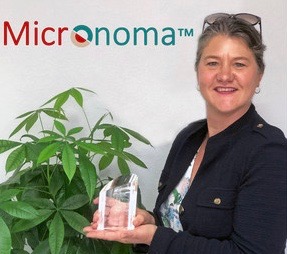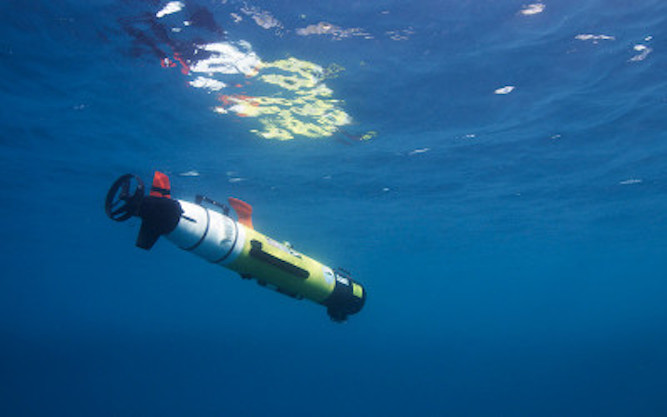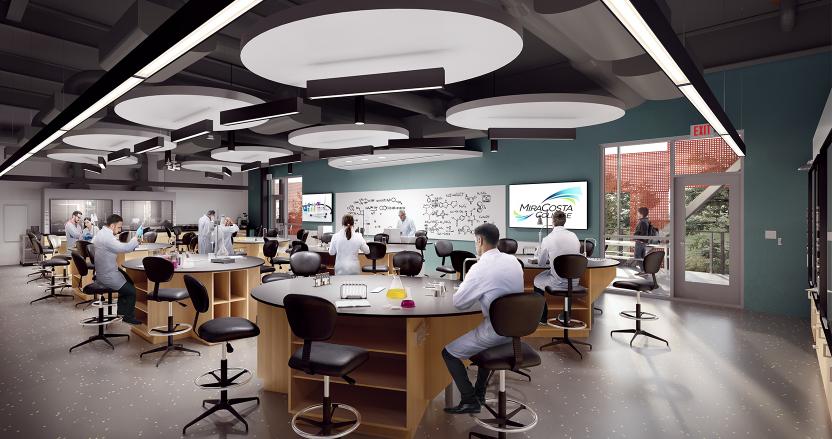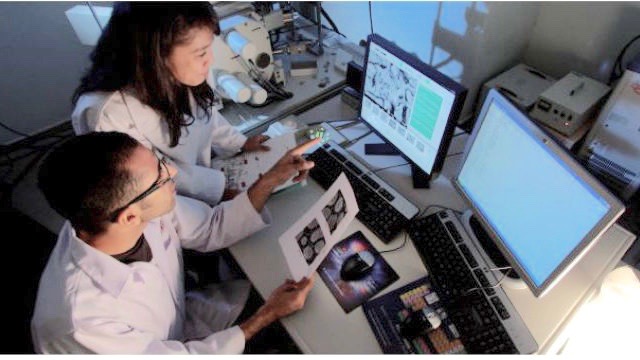Daily Business Report: Tuesday, August 3, 2021
Scripps Oceanography’s Project Recovery
aids in recovery of U.S. pilot’s remains
Scripps Institution of Oceanography’s Project Recovery aided in the recovery of the remains of a U.S. pilot killed during the Vietnam War through the use of advanced underwater technology. The recovery and identification of Major Paul A. Avolese’s remains in waters offshore of Vietnam were the result of work by Project Recovery with the Defense POW/MIA Accounting Agency (DPAA).
On July 7, 1967, a B-52D Stratofortress with seven crew members collided with another B-52 aircraft. Seven survivors were rescued. The remaining three crew members, including Avolese, who was the radar navigator on one of the aircraft, were lost during the incident and remained unaccounted for.
“For decades an operation like this was simply not feasible given the state of underwater technologies,” said Bob Hess, a development engineer at Scripps who participated in this and several previous undersea Project Recover expeditions. “By harnessing recent advances in these technologies, many of these sites throughout the world are becoming accessible for the first time. Being able to operate in such an isolated environment and not only locate the sites, but to be able to identify individual pieces of the wreckage is an amazing feat of man and technology. It is both exciting and humbling to be given the opportunity to locate these sites and bring closure to the friends and families of the fallen.”
PHOTO: An underwater view of Scripps Oceanography’s REMUS100 Autonomous Underwater Vehicle.
Bacon may disappear in California as pig rules take effect
CalMatters
First there was a shortage of toilet paper, then coins, then chlorine, now — bacon? California could lose almost all of its pork supply next year, when it starts enforcing a ballot measure voters approved in 2018 that requires more space for breeding pigs, egg-laying chickens and veal calves, the Associated Press reports.
Only 4 percent of hog operations nationwide currently comply with the rules, putting California — whose restaurants and groceries use about 255 million pounds of pork per month but whose farms only produce 45 million pounds — in a tough spot. And it’s unclear if relief is on the way: A federal judge last week rejected a legal challenge from the meat industry, though a coalition of California restaurants and business groups have petitioned Gov. Gavin Newsom to put the new requirements on hold. Critics say they could cause bacon prices to jump 60 percent in California, pushing a $6 package to $9.60.
Jeannie Kim, who runs SAMS American Eatery in San Francisco: “Our number one seller is bacon, eggs and hash browns. It could be devastating for us.”
Josh Balk of the Humane Society of the United States: “Why are pork producers constantly trying to overturn laws relating to cruelty to animals?”
Church’s Chicken to be acquired by
San Diego-based High Bluff Capital Partners
San Diego-based High Bluff Capital Partners, a private investment firm, announced it has entered into a definitive agreement to acquire Church’s Chicken, one of the world’s largest quick service chicken restaurant chains, from FFL Partners. Based in Atlanta and founded in 1952, Church’s has more than 1,500 locations in 26 countries and international territories.
Demonstrating considerable resiliency in the face of a devastating global pandemic, the chain in 2020 leveraged its strengths in family meals, digital offerings, delivery and to-go orders to post a strong year of performance, generating system-wide sales of nearly $1.2 billion.
Summer construction boom brings new
facilities to MiraCosta College campuses
New, state-of-the-art facilities will welcome students back to MiraCosta College for on-ground classes and activities.
Newly completed projects include a new Student Services Building at the Community Learning Center (CLC) and a new Student Services & Administration Building at the San Elijo Campus. Both projects were funded through MiraCosta’s capital improvement program using funds from Measure MM.
The new Student Services Building at the Community Learning Center (CLC) Campus is a 9,910-square foot building providing a centralized location for student services. It features numerous study areas and socialization spaces, along with staff space. The project architect is Lord Architecture. Align Builders served as the general contractor, and The Lightfoot Planning Group provided the landscape design.
At the San Elijo Campus, the renovation of the B100 Library Building is underway and expected to be completed in the fall of 2022. The $5.8 million project will include the renovation of approximately 14,000 square feet of space comprising the Library, tutoring spaces, computer labs, offices, and AV/IT support spaces. PBK Architecture designed the renovation and Conant Construction serves as the general contractor.
At MiraCosta’s Oceanside Campus, construction is underway for the third and largest new Student Services facility.
Signature Resolution opens new office in Del Mar
Signature Resolution, a company offering alternative dispute resolution services, with offices in Los Angeles and Century City, announced that it has opened a new office in Del Mar.
To open its new location, Signature Resolution said it recruited some of the most esteemed legal experts in the region, including Scott Slater Markus and the Hon. Margo Lewis Hoy (Ret.). Markus, San Diego’s leading attorney-mediator since 1992, will serve as a mediator for cases involving employment, professional liability, catastrophic injury, real property and business disputes. Judge Hoy, who recently retired from the bench after 11 years on the San Diego Superior Court, will handle disputes in all areas of family law.

Micronoma wins Bio-IT World
Innovative Practices Award
San Diego-based Micronoma, which claims to be the first cancer detection biotech company to diagnose cancer at an early stage, announced it has received the Bio-IT World Innovative Practices Award. The awards program highlights outstanding examples of how technology innovations and strategic initiatives can advance life sciences research, from basic biomedical research to drug development and beyond.
Micronoma’s microbiome-driven liquid biopsy method uses machine learning to examine thousands of microbiome plasma features to discover, validate, and translate microbial-derived biomarkers into an early cancer detection method.
The award from Bio-IT World recognizes that this process is designed to improve the chances of survival of cancer patients by discovering the disease in its earliest stages, including at stage I of the disease, when tumor size is still at its smallest.
NSF makes $20 million investment in AI
Research Institute led by UC San Diego
The National Science Foundation (NSF) announced an investment of $220 million to establish 11 artificial intelligence (AI) institutes, each receiving $20 million over five years.
One of these, The Institute for Learning-enabled Optimization at Scale (TILOS), will be led by the University of California San Diego in partnership with the Massachusetts Institute of Technology; San Diego-based National University; the University of Pennsylvania; the University of Texas at Austin; and Yale University. TILOS is also partially supported by Intel Corporation.
“These institutes are hubs for academia, industry and government to accelerate discovery and innovation in AI,” said National Science Foundation Director Sethuraman Panchanathan. “Inspiring talent and ideas everywhere in this important area will lead to new capabilities that improve our lives … and position us in the vanguard of competitiveness and prosperity.”
Obesity and cardiovascular factors combine
to cause cognitive decline in Latinos
Obesity is a major public health issue among Latinos, and a risk factor for Alzheimer’s disease. But in a new study, researchers at UC San Diego report that cardiometabolic abnormalities, such as hypertension, are more strongly associated with cognitive decline than obesity alone.
Researchers examined data from more than 6,000 participants enrolled in the Study of Latinos-Investigation of Neurocognitive Aging (SOL-INCA). Participants were ethnically diverse, including Central Americans, Cubans, Dominicans, Mexicans, Puerto Ricans and South Americans, residing in one of four U.S. cities: San Diego, New York City, Miami and Chicago.
Biomarker could help diagnosis
schizophrenia at an early age
Scientists at Sanford Burnham Prebys have discovered how levels of a protein could be used in the future as a blood-based diagnostic aid for schizophrenia.
The activity of the protein, which is found in both the brain and blood, affects neural connections in human brains and is uniquely imbalanced in people diagnosed with the condition. The research also provides guidance for future analyses into the molecular basis of this serious, disabling mental disorder.
The study, an international collaboration among groups at Yokohama City University Graduate School of Medicine in Japan and the Department of Psychiatry at Harvard Medical School in Belmont, Massachusetts, was recently published in PNAS.
UCAP Power acquires assets from Maxwell Technologies
UCAP Power Inc., a San Diego developer of ultracapacitor-based power solutions, announced it has completed the purchase of Maxwell Technologies Korea, the Korean-based ultracapacitor business, as well as other related assets including the Maxwell brand.
With the addition of these assets, which includes system patents and products, UCAP Power is building upon its foundation of success in driving innovation across the energy storage market, most recently exemplified by the launch of the company’s POWERBLoK battery replacement solution, the company said.
POWERBLoK’s design incorporates integrated charging and control to offer a scalable, long-life, safe sustainable alternative to lead-acid batteries.
Established in 2019, UCAP Power was founded by leaders in the ultracapacitor market, who had previously held positions in Maxwell Technologies’ leadership and product teams prior to Maxwell’s acquisition in 2019.
California Competes Tax Credit program available for businesses
The California Competes Tax Credit (CCTC) is an income tax credit available to businesses that want to locate in California or stay and grow in California. Businesses of any industry, size, or location compete for over $180 million available in tax credits by applying in one of the three application periods each year.
For fiscal year 2021-2022, GO-Biz will accept applications for the California Competes Tax Credit during the following periods:
• July 26, 2021 – Aug. 16, 2021
• Jan. 3, 2022 – Jan. 24, 2022
• March 7, 2022 – March 28, 2022
Prior to each application period, GO-Biz hosts online webinars about the California Competes Tax Credit program. All businesses are encouraged to participate and view the GoBiz webinars to receive instructions on how to apply. SDNEDC can also assist with applications and connecting North County businesses with the right resources so as to increase their potential to win one of the awards.
San Diego’s medium home price reaches
$750,000 in June, another record high
Driven by persistent shortages of homes for sale — coupled with low mortgage rates luring more buyers into the market — the median home price in the region rose to a record $750,000 in June, according to data released Tuesday from CoreLogic/DQNews.
That’s up from the previous record of $725,000, which was set in May. A year ago, the median price — the point where half of all homes sold for more and half sold for less — was $600,500. Unlike the housing bubble in the late 2000s, where easy-money lending practices drove up housing prices, this spike appears to be centered on extremely low inventories of homes and condos on the market.
It could take some time before the pace of price increases moderates, according to real estate experts. The number of homes for sale isn’t expected to match demand anytime soon. While rising mortgage rates could cool the market, there are few signs of significant rate hikes on the horizon.
General Atomics launches new full Spectrum
Imaging System for forensic evidence capture
General Atomics Electromagnetic Systems (GA-EMS) announced the launch of its next generation Full Spectrum Imaging System (FSIS) at the International Association of Identification (IAI) conference being held Aug. 2-7 in Nashville, Tenn.
The FSIS II incorporates a powerful new color camera and patented software to provide customers 10 times greater scan and processing speeds to capture high-resolution images of biological, chemical, pattern, and trace evidence from curved, textured and flat surfaces. FSIS II will be on display in the Arrowhead Forensics, GA-EMS’ exclusive reseller, exhibit booth during the IAI conference.
“FSIS II provides game-changing capabilities to speed up the scanning process across the full UV, visible and IR spectral range, allowing users to search, detect and capture the highest resolution images of trace evidence in full color,” said Scott Forney, president of GA-EMS. “FSIS II brings together advanced camera capabilities with innovative software to shorten the time it takes to scan for and capture evidence imagery, helping get critical evidence processed faster and more efficiently than ever before.”





